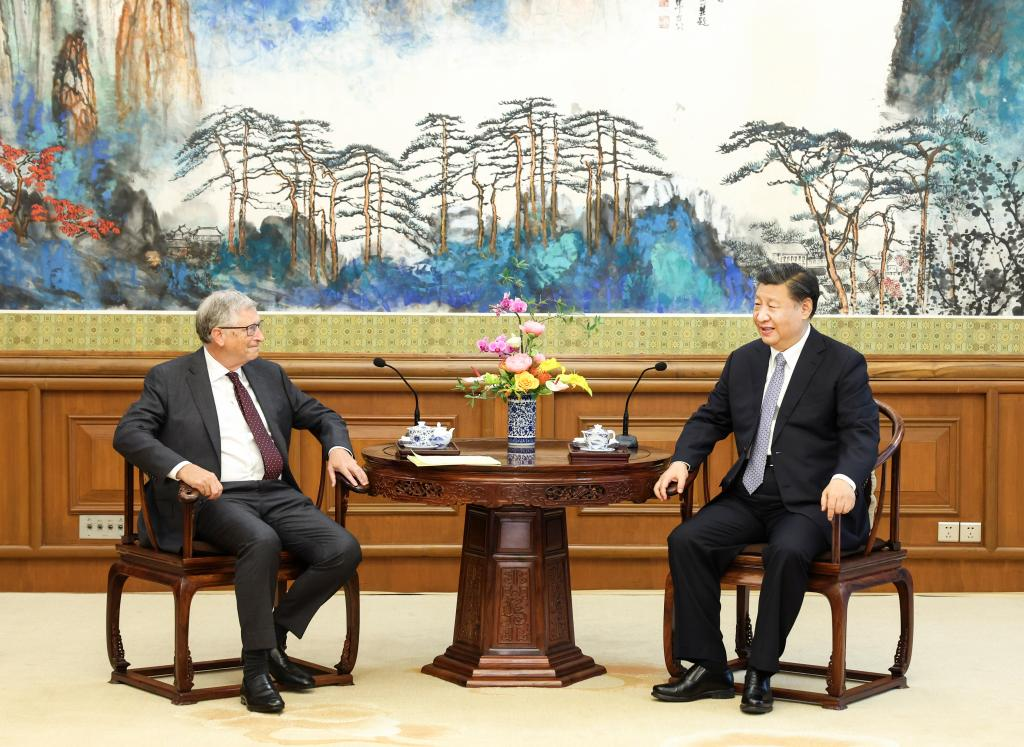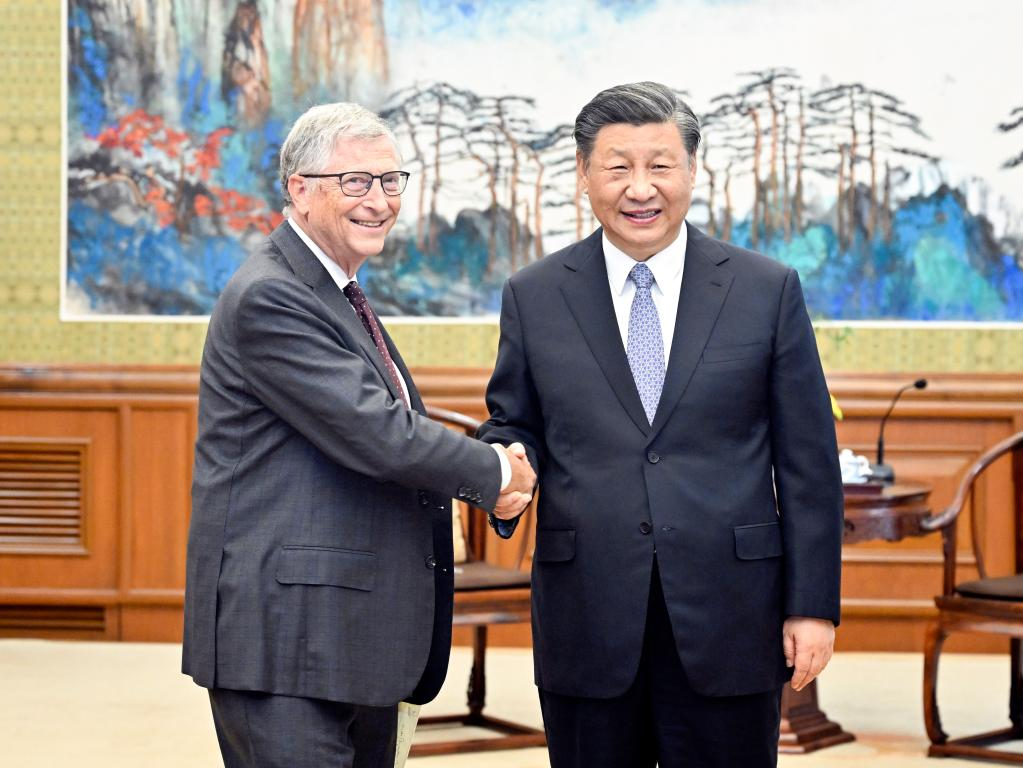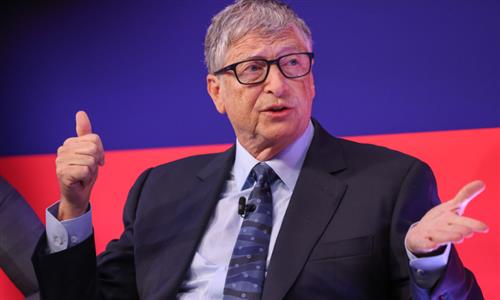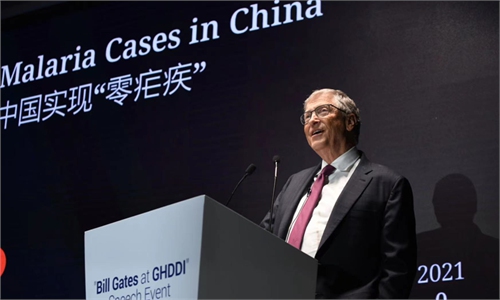Foundation of China-US relations lies in people, Xi tells Gates
People-to-people exchange could act as buffer to alleviate China-US tensions, experts say

Chinese President Xi Jinping meets with Bill Gates, co-chair of the Bill & Melinda Gates Foundation, in Beijing, capital of China, June 16, 2023. Photo:Xinhua
Chinese President Xi Jinping on Friday met with Microsoft co-founder and philanthropist Bill Gates as the latter has been paying a highly-anticipated visit to China hot on the heels of other US business icons, and during the trip he also met with other high-level officials, with both sides expressing willingness to join hands to solve global challenges and help developing nations.
The meeting, which took place as US Secretary of State Antony Blinken prepares for a long-awaited trip to China, illustrated clearly that China's door has never shut on cooperation with the US and its sincere hope for a stable and healthy relationship has been consistent when dealing with non-governmental or governmental figures.
Greeting the 67-year-old US entrepreneur in Beijing's Diaoyutai state guesthouse, where China's leaders have historically received senior foreign guests, Xi called Gates the first "American friend" he has met in Beijing this year.
"The foundation of China-US relations lies in the people. We have always placed our hope on the American people and wish all the best for the friendship between the two peoples," Xi said, adding that people should travel and communicate more to increase their understanding as the world emerges from the COVID-19 pandemic.
Xi applauded Gates and the Gates Foundation for their long-term work to promote poverty reduction, health, development and philanthropy around the world, vowing that China will continue to strengthen cooperation with the Gates Foundation in relevant fields, and will provide support and assistance to other developing countries within its capacity.
Stressing that China is committed to advancing the great rejuvenation of the Chinese nation on all fronts through a Chinese path to modernization, Xi said China will never fall into a pattern of seeking hegemony, and will instead work with other countries to achieve common development and build a community with a shared future for humanity.
Gates, who landed in China on Wednesday, said during the meeting that China has made huge achievements in poverty reduction and dealing with the coronavirus, which he said set a good example for the world.
In recent years, the Gates Foundation's cooperation with China has made remarkable progress, and that accelerating innovation and development in China is good for China, developing countries and the world, Gates said.
The Gates Foundation is committed to strengthening cooperation with China in the fields of innovation, global poverty reduction, public health, research and development of drugs, rural areas and agriculture, and spreading successful practices and technologies to other developing countries, he said.
Gates has updated details of his China trip on his Sina Weibo account. On Wednesday, he said on the platform that this was his first visit to China since 2019. One day later, he published on Weibo the speech he delivered at the Global Health Drug Discovery Institute (GHDDI) in Beijing.
The Bill & Melinda Gates Foundation on Thursday announced that it has renewed collaboration with the Beijing Municipal Government and Tsinghua University on innovative therapies for infectious diseases prevalent in low- and middle-income countries, pledging a donation of $50 million for the joint endeavor.
Chinese Minister of Finance Liu Kun also met with Gates on Thursday and they exchanged views on issues such as addressing common global challenges, financing for development and the role of multilateral development banks, according to the ministry on Friday.

Chinese President Xi Jinping meets with Bill Gates, co-chair of the Bill & Melinda Gates Foundation, in Beijing, capital of China, June 16, 2023. Photo:Xinhua
Private cooperation
Some experts viewed Xi and Gates' meeting as a "heart-warming interlude" in China-US relations, as it shows that the US business circle is determined to invest in China despite political fluctuations, adding that China welcomes such interaction with open arms.
"President Xi is sending a signal that China welcomes overseas companies, including US firms. China attaches great importance to and respects leading, innovative enterprises," Cong Yi, dean of the School of Marxism at Tianjin University of Finance and Economics, told the Global Times on Friday.
The frequent visits to China by US company executives show their eagerness to develop in China, as its huge market and complete industrial system cannot be replaced by any other economy in the world, Cong said.
"It's both impossible and uneconomical to decouple from China," Cong said.
Apart from Gates, other US business executives including Apple's Tim Cook and Tesla's Elon Musk also visited China in recent months. Chinese State Councilor and Foreign Minister Qin Gang met with Musk during his visit.
Lü Xiang, research fellow at the Chinese Academy of Social Sciences, told the Global Times on Friday that it is rare for President Xi to meet with an individual entrepreneur.
According to Lü, Gates is different, firstly because Microsoft's success overlapped with China's opening-up to the world and digitalization, and heralded sound China-US cooperation; secondly his philanthropist career is deeply interwoven with China's efforts to first solve domestic growth challenges and then contribute to global development.
Buffer to tensions
With the bilateral relationship sliding to dangerous lows, the meeting delivered a firm and clear message that stable and healthy China-US relations are in the interests of both countries and the world, and conveyed the hope that non-governmental exchanges and connections can keep the China-US bond unbroken amid chilly diplomatic relations, Lü said.
Business interaction and cultural exchanges can act as a buffer to alleviate the tensions between the Chinese and US governments, He Weiwen, a senior fellow at the Center for China and Globalization, told the Global Times on Friday, citing the "Ping-Pong Diplomacy" of the 1970s.
He noted, "American people don't have the need to seek global hegemony like Washington has, while the US is made up of people and not just politicians. The peoples of China and the US can, and have the need to carry out cooperation that meets both sides' interests," He said.
China has never shut the door to cooperation with the US, and by receiving non-governmental figures like Gates and high-profile officials like Blinken, China aims to convey a firm, clear and consistent message that the two sides should seek to improve relations for the sake of the two countries and the world, experts said.
However, anti-China hawks in Washington hold on to a major strategic misjudgment that China is the US' "primary rival" and "the most consequential geopolitical challenge."
Former US Secretary of State Henry Kissinger, a witness to and main actor behind the China-US icebreaking five decades ago, said it is up to Washington and Beijing to step back from their standoff, which is at "the top of a precipice," Bloomberg reported Thursday.
It is hoped that the US meets China halfway to effectively manage differences and promote communication and cooperation, so as to reverse the downward spiral and stabilize bilateral relations, Chinese Foreign Ministry spokesperson Wang Wenbin said at Friday's routine press briefing.
Both sides should correctly view each other's domestic and foreign policies and strategic intentions, respect each other, coexist in peace, pursue win-win cooperation, and explore the right way to get along with each other, Wang said.
There is competition between the two countries in areas such as economy and trade, but there should be no vicious zero-sum competition, the spokesperson said.
Though both China and the US hold "low expectations" for Blinken's visit, and the emphasis on non-governmental connections appears to underscore the dim prospects of governmental interactions, Lü said, noting that Blinken's trip is an important chance to avoid a "worse than the worst" scenario.
Remarks from US officials on the agenda and expectations of Blinken's visit have been "restrained," which helps improve the tense atmosphere between the two countries and allows communication to be more effective, according to Lü.
The US has recognized the risk and danger of a conflict, and there is still a small "window of opportunity" for the two countries to drag relations back from rockbottom, Lü said.


